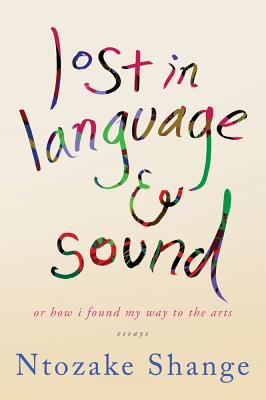Book Review: Lost In Language & Sound: Or How I Found My Way To The Arts:Essays
Reviewed by:
Alvin RomerPoetry and prose if presented and mixed well with a demonstrative esthetic can work wonders for anyone trying to illustrate artistic value. Obie award-winning author and principal of ‘for colored girls who have considered suicide/when the rainbow is enuf’, Notozake Shange has given us yet, another gem after the acclaimed Some Sing, Some Cry. This time around it’s ‘lost in language & sound.’
Readers who may not be familiar with the author would get quite a bit of
information behind the scenes as she writes poignantly her emanation from
minor to major. As such, the book reads like an autobiographical sketch
exploring and expounding on how linguistic fortitude and specific aspects of
the humanities has shaped her voice and virtue. It's much more prolific as
she gives a profound personal look at the reflections through flashbacks on
what it means to be artistic without compromise, a woman of worth, while
allowing her blackness to be all that the race requires.
The book is unique in the fact that it's descriptive in how she got from
point A to B and all other points in between! I like the fact that she wrote
it in the style that is uniquely hers (i.e., writing in lower case and using
backslashes throughout), and with a sense of continuity that doesn’t lose
the reader. Written with three distinct themes, the chapters are short but
inspiring, each with reasons for all things relative to the craft. If
anything, the sheer stylistic rendering forces you to keep up with the pace
without losing insight. Essays play a strong part in describing a storyline
that defines clarity in specific points of view, and most importantly,
telling more stories ranging from the sublime to dramatic interludes. Her
celebrated play “for colored girls” is prominently highlighted relative to
the fact that it defined her need to present on her own terms realigning the
English language to allow that production to shine. In it, and vestiges of
the book, it reaffirms both generically and individually the female
experience, the black experience and racial overtones. The question rendered
(and answered quite adequately) was how do one live the aforementioned lives
simultaneously borrowing artistic traits from her father and mother and
making them a vociferous force?
Ntozake Shange wrote in such a way that it made me feel like I should have
been there to witness first hand her maturation process, or at the very
least know that she belongs head and heels along side her peers in other
persuasions. Whether you're a fan or not, this is a book hard not to
like…Ntozake Shange enthusiasts will readily add this one to the others on
their bookshelves. I felt her angst, reveled in her passion for love of the
arts in muscic and dance. There's a beautiful cadence to her words that flow
like the the best river without rapids, but full of purposeful rhythm. I had
no problem rating this book 5 stars (out of 5) and recommend it for the
masses!


